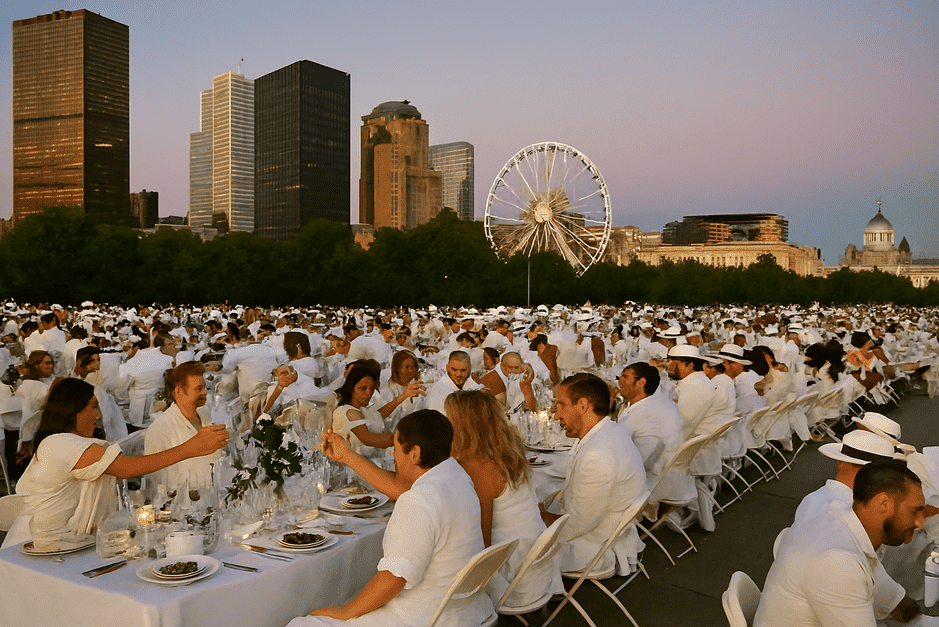Table of Contents
- Introduction
- History of the Global All-White Picnic
- What Happens at the Event
- How to Participate
- Frequently Asked Questions
Introduction
Le Dîner en Blanc is a world-renowned all-white pop-up picnic that transforms cities into elegant dining and cultural experiences. Guests dressed in white gather at secret locations to enjoy gourmet meals, music, and dancing while celebrating community and style. This iconic event encourages social connection and creativity. Whether attending for the first time or as a returning participant, Le Dîner en Blanc offers a unique opportunity to experience a global cultural event.
History of the Global All-White Picnic
The first Le Dîner en Blanc was held in Paris in 1988 by François Pasquier, who invited friends for a white-themed picnic. Today, the event spans over 90 cities worldwide, including New York, Chicago, and Singapore (Wikipedia). Thousands of participants annually enjoy this exclusive cultural gathering, making it one of the most recognized pop-up picnics globally. For more details on the event’s history, visit the official Le Dîner en Blanc website.
What Happens at the Event
At a pop-up picnic, attendees can expect:
- Secret Locations: The venue is revealed shortly before the event.
- Elegant Attire: Guests wear all-white outfits and accessories.
- Gourmet Dining: Participants bring tables, chairs, and meals.
- Entertainment: Music, dancing, and occasional performances.
- Community Spirit: The event fosters connections and shared experiences.
For related experiences, see the guide to global pop-up gatherings.
How to Participate
- Register through the official Le Dîner en Blanc website.
- Receive an Invitation: Priority access is often for returning attendees.
- Prepare: Bring a white table, chairs, and a gourmet meal.
- Arrive: Follow instructions to set up at the secret location.
Frequently Asked Questions
Q: Can I attend without an invitation?
A: Most events are invite-only, but some cities maintain waiting lists (Axios coverage).
Q: What if it rains?
A: The event proceeds rain or shine; bring clear or white rain gear.
Q: Is alcohol allowed?
A: Policies vary by location; some events offer wine or champagne for purchase.
Q: How should I dress?
A: Guests must wear all white, including accessories and shoes.
Small Luxury Hotels FAQ
Introduction
This small luxury hotels FAQ answers common questions about boutique stays. It explains definitions, differences with large chains, and which services to expect. In addition, it covers family options, sustainability, and tips on finding the right property.
What defines a small luxury hotel?
- Fewer than 100 rooms.
- Personalized attention and privacy.
- Strong links to local design.
- Locations in unique urban or rural areas.
As a result, travelers often choose them for a more intimate experience. Moreover, their distinctive style sets them apart from standardized hotels.
Why choose a small luxury hotel?
Personal service
Staff remember guest details, therefore creating a sense of familiarity.
Calm spaces
Unlike large hotels, these properties feel quieter, so you can relax more easily.
Local culture
For example, menus highlight regional produce, and interiors reflect local crafts.
In addition, many guests return because the experience feels authentic.
How do small luxury hotels differ from large chains?
Guest experience
Small hotels provide tailored attention, while chains rely on uniform systems.
Property identity
Each boutique hotel has its own theme. On the other hand, large chains repeat formats worldwide.
Dining approach
Menus change seasonally and locally. Therefore, guests enjoy fresh variety instead of standard global menus.
Are small luxury hotels only for leisure stays?
Business features
- Lounges double as meeting rooms.
- Private dining options support work dinners.
Digital needs
- Fast Wi-Fi supports remote work.
- Quiet spaces help concentration.
Because of these advantages, small luxury hotels appeal to both business and leisure travelers.
What services can you expect?
- Concierge services for tours and dining.
- Fine dining menus with seasonal ingredients.
- Spa and wellness treatments.
- Added extras like minibars and welcome gifts.
Moreover, services shift depending on location. For example, a city hotel might offer cultural tours, while a rural retreat offers farm experiences.
Are small luxury hotels family-friendly?
Options for families
- Connecting rooms for parents and children.
- Child-friendly amenities such as menus or games.
Adults-only stays
- Some properties focus on privacy.
- Guests find peaceful, child-free environments.
Therefore, always check booking policies, because each hotel sets its own approach.
Do these hotels support sustainability?
Sourcing and dining
Farm-to-table meals reduce transport impact. In addition, guests enjoy fresher produce.
Environmental focus
Plastic use is restricted, while refillable bottles are encouraged. Smart energy systems reduce wastage.
Local involvement
Hotels support the community by hiring regionally. As a result, growth extends beyond the property.
How do you find the right small luxury hotel?
Define needs
Decide if food, spa, culture, or privacy is your top priority.
Check guest feedback
For example, repeat reviews about service often signal consistency.
Compare value
Packages may include meals, transfers, or early check-in. Therefore, higher prices can still deliver stronger value.
Are small luxury hotels worth the price?
Value of service
Guests pay for attention, comfort, and privacy. Moreover, experiences feel tailored and unique.
Extras add value
Some hotels include exclusive experiences or benefits. Finally, weigh these extras against nightly rates.
As a result, many travelers feel these hotels justify their price when quality matters most.



